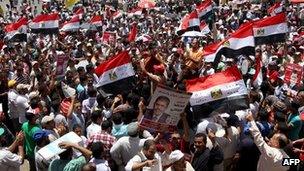Shafiq or Mursi? What may happen next in Egypt
- Published

The announcement of the Egyptian presidential election result has been delayed pending a decision by the Higher Presidential Election Commission (HPEC) on complaints filed by both candidates.
The Muslim Brotherhood (MB) candidate Mohammed Mursi and ex-prime minister Ahmed Shafiq have put in more than 400 appeals about alleged violations in the run-off.
As both contestants have claimed victory, the expected announcement will be made during an already tense situation, fanned by a new constitutional declaration by the military council limiting the president's powers and granting itself greater control.
If Shafiq wins
The Muslim Brotherhood is unlikely to accept a victory by Mr Shafiq.
Mohammed Mursi claimed victory early on and, with the help of the media, has generated an atmosphere in which there is a belief that he is the winner.
Mr Shafiq was slower to claim victory.
The order of events has given rise to rumours - especially among Brotherhood supporters - that there may be an intention to rig the elections in favour of Mr Shafiq.
The Brotherhood will probably use the weapon of protests and sit-ins. It has already announced open-ended sit-ins in city squares until the results are out.
The Brotherhood will take advantage of the enmity the revolutionaries have towards the military rulers, whom it suspects of wanting to remain in power with Mr Shafiq as their front man.
There are fears that the situation could turn violent, like in Algeria where an estimated 150,000 people died in the years after the 1992 elections were scrapped when it became clear that the Islamists had won.
However, the Brotherhood has been trying to play down this scenario.
Egyptian newspapers quoted the Brotherhood leader and Speaker of the dissolved parliament, Muhammad Sa'd al-Katatni, as saying: "The Egyptian people are different and are not armed… We will launch a legal struggle through legal institutions and a popular struggle in the squares."
If Mursi wins
Mr Shafiq's supporters were initially primed for his loss and their reactions are unlikely to be particularly sharp if Mr Mursi is eventually declared as winner.
Mr Shafiq's campaign has said that if he was defeated then the ex-prime minister would be the first to congratulate Mr Mursi.
Also, unlike the followers of the Brotherhood, many of Mr Shafiq's supporters are not organisationally bound. They consist of former ruling party members, Coptic Christians, people who yearn for stability and a restoration of law and order, and others who hate the Muslim Brotherhood.
Some may protest in Abbasiya Square, where crowds have gathered before in support of Gen Omar Suleiman, Hosni Mubarak's former vice-president and spy chief, when they wanted him to run for president.
While there may not be a major reaction to a Mursi victory on the streets, there is likely to be a confrontation at a different level: between Mr Mursi and what is now called the "deep state".
The army has already secured complete control over its own affairs, limited the president's powers and ensured a future role in drafting the new constitution.
For decades, the different branches of government, particularly those concerned with security, dealt with the Muslim Brotherhood as an enemy and threat. Being subservient to the Brotherhood will not be something that they will easily accept.
In this context, there are fears that they will try to make trouble for the new president, in an attempt to unsettle his position and make him appear a failure.
The Brotherhood has already accused the security services of standing behind Mr Shafiq.
A third scenario?
Although people are expecting an imminent announcement of the election result, an unexpected scenario could unfold: cancellation of the results and a re-run of the elections, at least in some provinces.
According to the complaints filed by both candidates, a long list of irregularities and violations took place during the run-off.
For example, Mr Shafiq's lawyers allege that in a number of provinces, ballot papers arrived at polling stations with Mr Mursi's name already selected.
Farouq Sultan, the head of the election commission, has reportedly said that as many as a million votes could be invalid.
BBC Monitoringselects and translates news from radio, television, press, news agencies and the internet from 150 countries in more than 70 languages. It is based in Caversham, UK, and has several bureaux abroad. For more reports from BBC Monitoring, click here